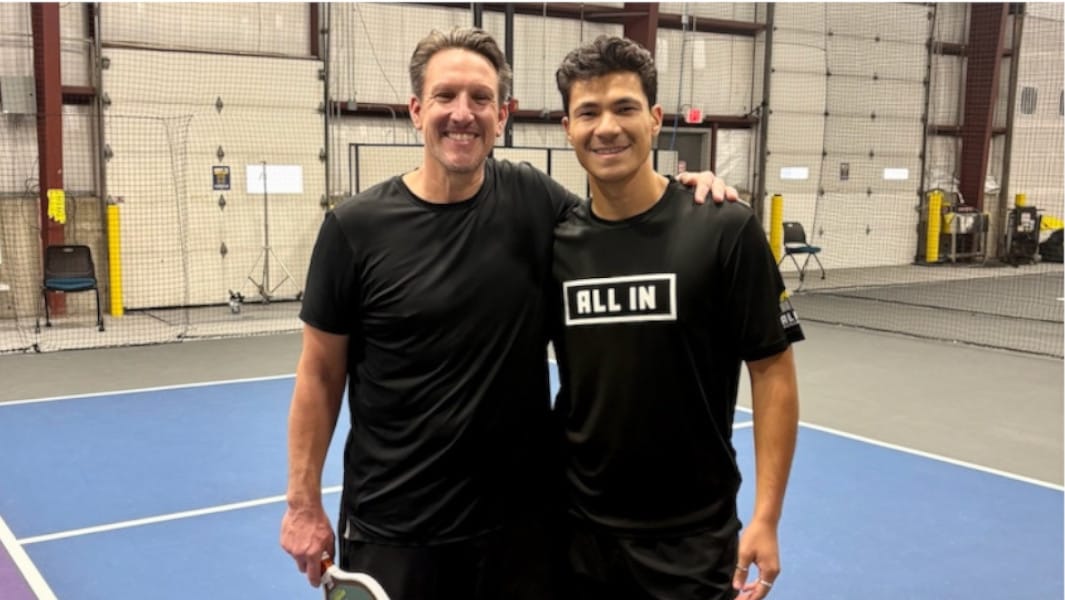I love pickleball.
It is fun to play, easy on the joints, and provides a good workout. It’s no wonder that pickleball is one of the fastest growing activities in America.
The benefits from pickleball are both physical and social. Any activity such as pickleball that increases our heart rate and gets us moving around supports physical strength and agility – and can even sharpen our mental clarity.
Pickleball is also quite social. Not only do players often talk during the game and share tips, but new friendships may develop. As a side note, I now have about a dozen contacts in my phone whose last name is "Pickleball."
Whenever we engage in a repeated activity, such as playing pickleball, we tend to develop new habits. Pickleball players may find themselves drinking more water, stretching more often, and getting more quality sleep. The effects of these positive habits are not limited to pickleball; they spill over to other parts of our lives that may include relationships and how we make decisions.
In that sense, playing pickleball could help you make better decisions with respect to money and investing.
Improving Your Game
There are many different skill levels with pickleball. As with most things in life, no one is born a top-notch pickleball player. Improving your game requires practice, understanding the strategy of the game, and seeking feedback from others. I am competitive by nature and always seek to improve myself.
I initially viewed pickleball as a simple and easy game. But I soon learned that there was much to learn and improve if I wanted to excel. I wanted to be able to play with some of the best, thus benefitting from the fun of the game and a sense of accomplishment as I improved my game and obtained better results.
In my quest to learn pickleball strategy and playing tips from the best, I was overwhelmed by the amount of information out there. There are different playing styles, many opinions, and "winning tips" that at times seemed contradictory. Online videos and social media are littered with everyone sharing tips about how to hit better dinks, serves, and volleys. But what was the right strategy for me, given my strengths and desired game play? That was my first big challenge in improving myself as a pickleball player – deciding which information was right for me and which I should ignore.
Pickleball and Your Money
I realized that the steps and process to improve as a pickleball player were very similar to improving one’s personal finances. Just as pickleball has the potential to improve our lives, so does making wise financial decisions. Improving at either endeavor requires patience, diligence, and knowing which strategy is right for us. While there are a lot of pickleball "best practices," there are even more opinions, ideas, and strategies when it comes to our financial lives.
The financial world is more complex than pickleball and there is endless "noise" that come from financial programs, social media, and our family and friends. For instance, you may hear someone talk about the latest "hot" investment idea, the potential or danger of investing in stocks, real estate, or alternative investments.
These ideas and opinions are often backed by certain facts and can seem like a sure thing. But investors must question three things:
- Does the idea incorporate all information?
- How might the information (or individual providing the information) be biased?
- Would this idea be best for me, given my situation and goals?
Many investors have experienced well-meaning and influential ideas that sounded great and seemed like a no-lose proposition, only to be disappointed when they didn’t perform as expected.
Sometimes the advice can pertain to a specific security or trying to time the market – when to get in and when to get out. Because there is so much riding on our investment decisions, it is important to take a thoughtful, deliberate approach to identifying the right strategy for you, considering the right information, and defining the right decision-making process.
Working With a Coach
After playing pickleball for a few months, I decided to get serious about improving my game.
Since seeking advice online was not helpful, I decided to hire a coach. This coach got to know my strengths, weaknesses, and desired game play. They provided specific advice for my personal training, strategy, and where I most needed to focus my attention.
How to Become a Pickleball Coach or Instructor
Pickleball is booming and there is a high demand for new coaches in the sport. If you’re interested in becoming a pickleball coach, this guide is for you.
 The Dink PickleballJason Flamm
The Dink PickleballJason Flamm

This brought immense clarity and confidence for me. I no longer needed to guess which pickleball strategy and tips were best for me – I now had a personal plan. And with this plan, my game play has improved immensely.
When I play, I don’t worry about how other people play. I just focus on the strategy my coach and I developed for my success. This is really no different from investing. A trusted coach (financial advisor) can create a personalized plan/strategy for you based on your unique circumstances and aspirations – providing guidance and direction to improve your financial life.
Today’s investment world is complex, noisy, and challenging. In the last few months, I've been getting more and more feedback from my readers that they're getting concerned about these financial challenges:
- Paying more in taxes than they should on their investments
- Their current advisor is not meeting their expectations, addressing their concerns, nor helping them make sense of all the noise
- Inflation continues to eat away at their income and long-term investments
These challenges, along with the constant uncertainties of the market, can make it difficult to know what is best for your specific situation. We all have different risk preferences, levels of psychological and financial tolerance, and things we value most.
I have been helping people create their personal investment strategy and make better investment decisions for over 16 years. I love helping others improve their decisions.
If you are committed to making better investment decisions, I invite you to contact me for a complimentary 20-minute consultation. You may call or text me at 972-837-3258 or alternatively click here to schedule your personal 20-minute consultation.
David Miller is a Financial Advisor with Morgan Stanley
The views expressed herein are those of the author and do not necessarily reflect the views of Morgan Stanley Wealth Management or its affiliates. All opinions are subject to change without notice. Neither the information provided nor any opinion expressed constitutes a solicitation for the purchase or sale of any security. Past performance is no guarantee of future results.
The investments listed may not be appropriate for all investors. Morgan Stanley Smith Barney LLC recommends that investors independently evaluate particular investments, and encourages investors to seek the advice of a financial advisor. The appropriateness of a particular investment will depend upon an investor's individual circumstances and objectives.
Morgan Stanley Smith Barney LLC (“Morgan Stanley”), its affiliates and Morgan Stanley Financial Advisors or Private Wealth Advisors do not provide tax or legal advice. Clients should consult their tax advisor for matters involving taxation and tax planning and their attorney for matters involving trust and estate planning and other legal matters.
Morgan Stanley Smith Barney LLC. Member SIPC.
Anuncie Aqui / Advertise Here
Sua marca para o mundo Pickleball! / Your brand for the Pickleball world!

 English
English  Spanish
Spanish  Portuguese
Portuguese  German
German  Italian
Italian  Japanese
Japanese  French
French  Polish
Polish  Russian
Russian  Netherlands
Netherlands  Hungarian
Hungarian  Turkish
Turkish  Videos
Videos 








 English (US) ·
English (US) ·  Portuguese (BR) ·
Portuguese (BR) ·